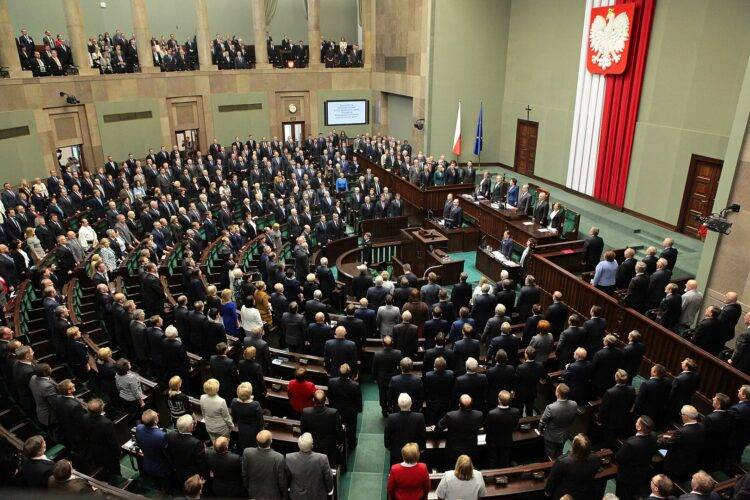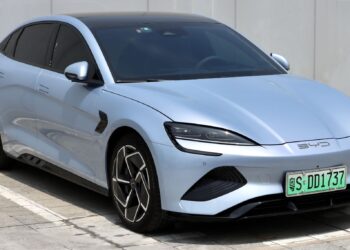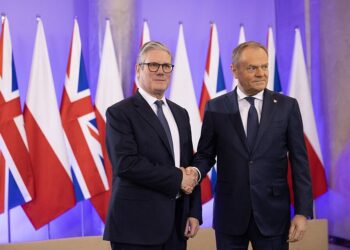WARSAW, Poland – On Sunday, October 15, 2023, Poles will go to the polls to elect members of the Sejm (lower house of parliament) and the Senate (upper house of parliament). The election is widely seen as a defining moment for the country, as it will determine the direction of Poland in the years to come.
- Join us for our LIVE Election Night.
- Exit polls, reactions, potential shape of the next government and finally, the results — all LIVE from 8pm Polish time / 1pm Central Time
- Don’t forget to follow us on Facebook and Twitter.
Participating Parties
Prawo i Sprawiedliwość (PiS) (Law and Justice)
PiS is a conservative nationalist party that has been in power in Poland since 2015. It is led by Jarosław Kaczyński and has a strong base of support among rural voters and older Poles. PiS is known for its populist rhetoric and its attacks on the European Union and the media.
Program:
Family values: PiS supports traditional family values and opposes same-sex marriage and abortion.
Social welfare: PiS has introduced a number of social welfare programmes, including a child benefit programme and a pension reform.
Nationalism: PiS promotes a strong sense of Polish nationalism and has taken steps to increase the country’s military spending.
Euro skepticism: PiS is critical of the European Union and has clashed with the EU on a number of issues, including immigration and the rule of law.
Koalicja Obywatelska (KO) (Civic Coalition)
KO is a centrist-liberal coalition that is the main opposition party to PiS. It is led by Donald Tusk, the former Prime Minister of Poland and President of the European Council. KO is made up of two main parties: Civic Platform (PO) and Nowoczesna (.N).
Program:
Rule of law: KO is committed to upholding the rule of law and restoring Poland’s democracy.
Economy: KO supports a free-market economy and closer integration with the European Union.
Social justice: KO is committed to reducing poverty and inequality in Poland.
Environment: KO supports environmental protection and the fight against climate change.
Lewica (The Left)
Lewica is a left-wing coalition that is made up of three parties: the Social Democrats of Poland (SLD), the Spring movement, and Together. Lewica is led by Włodzimierz Czarzasty and has a strong base of support among young voters and urban Poles.
Program:
Social justice: Lewica is committed to reducing poverty and inequality in Poland. It supports higher wages, better working conditions, and stronger social safety nets.
Climate change: Lewica is committed to fighting climate change. It supports investing in renewable energy sources and reducing Poland’s reliance on coal.
Democracy: Lewica is committed to upholding democracy and the rule of law. It opposes PiS’s attacks on the media and the judiciary.
Trzecia Droga (The Third Way)
Trzecia Droga is a centrist coalition that is made up of two parties: Poland 2050 and the Polish People’s Party (PSL). Trzecia Droga is led by Szymon Hołownia and Władysław Kosiniak-Kamysz.
Program:
Economy: Trzecia Droga supports a strong economy that benefits all Poles. It supports investing in infrastructure, education, and research.
Social justice: Trzecia Droga is committed to reducing poverty and inequality in Poland. It supports higher wages, better working conditions, and stronger social safety nets.
Environment: Trzecia Droga is committed to fighting climate change. It supports investing in renewable energy sources and reducing Poland’s reliance on coal.
Konfederacja (Confederation)
Konfederacja is a far-right coalition that is made up of four parties: the Confederation of Polish Crown, the National Movement, the Wolność Movement, and the KORWiN Movement. Konfederacja is led by Sławomir Mentzen,Janusz Korwin-Mikke, Robert Winnicki, and Grzegorz Braun.
Program:
Libertarianism: Konfederacja is a libertarian party that supports individual freedom and limited government.
Nationalism: Konfederacja promotes a strong sense of Polish nationalism.
Euro skepticism: Konfederacja is critical of the European Union and wants Poland to leave the EU.
The 2023 Polish parliamentary election is shaping up to be a close contest between PiS and KO. Both parties have strong bases of support, but it is unclear which party will be able to win over undecided voters. The other parties in the election, Lewica, Trzecia Droga, and Konfederacja, are unlikely to win enough seats to form a government on their own, but they could play a role in a coalition government.
Current Government
The current Polish government is led by PiS leader Jarosław Kaczyński. PiS has made a number of changes to the country’s legal system, including reforms to the Constitutional Court and the Supreme Court. These reforms have been criticized by the opposition and by the EU as undermining the rule of law.
PiS has also clashed with the EU on a number of issues, including immigration and climate change. In 2017, the EU triggered Article 7 of the Lisbon Treaty against Poland, a process that could lead to the suspension of Poland’s membership in the EU.
Political Issues from the Past 8 Years
A number of political issues have dominated Polish politics in the past 8 years, including:
The rule of law: PiS has been accused of undermining the rule of law in Poland through its reforms to the legal system. The opposition and the EU have criticized these reforms, arguing that they weaken the independence of the judiciary and make it more difficult to hold the government accountable.
Relations with the European Union: PiS has also clashed with the EU on a number of issues, including immigration and climate change. The EU has accused Poland of violating EU law and has threatened to take action against the country.
Social welfare: PiS has introduced a number of social welfare programs, such as the 500+ program, which provides financial assistance to families with children. These programs have been popular with voters, but they have also been criticized for being expensive and for contributing to Poland’s high budget deficit.
LGBTQ rights: PiS has taken a hostile stance towards LGBTQ rights. The party has supported legislation that would discriminate against LGBTQ people. PiS has also been accused of using homophobic rhetoric to scapegoat LGBTQ people.
- Join us for our LIVE Election Night.
- Exit polls, reactions, potential shape of the next government, and finally, the results – all LIVE from 8pm Polish time / 1pm Central Time
- Don’t forget to follow us on Facebook and Twitter.
Opposition Point of View
The opposition in Poland has accused PiS of undermining the rule of law, damaging relations with the EU, and implementing harmful social policies.
The opposition has also argued that PiS’s social welfare programs are unsustainable and that they will lead to higher taxes and inflation in the long run.
The opposition has also criticized PiS for its record on LGBTQ rights. The opposition has argued that PiS’s policies are discriminatory and that they have created a climate of fear and hatred for LGBTQ people in Poland.
Government’s Achievements
PiS has defended its record in government, arguing that it has made Poland a stronger and more prosperous country.
PiS has pointed to its economic record, noting that Poland has experienced strong economic growth under its leadership. PiS has also pointed to its social welfare programs, arguing that they have helped to lift many Poles out of poverty.
PiS has also defended its reforms to the legal system, arguing that they were necessary to improve the efficiency and effectiveness of the courts.
Electoral silence
On the day before and on the day of the 2023 Polish parliamentary elections, there will be an electoral silence. This means that all campaigning activities will be prohibited, including through the media, social media, and in person. The purpose of electoral silence is to give voters a quiet time to consider their votes and to prevent any last-minute attempts to influence them.
There are a few exceptions to electoral silence. For example, political parties and candidates are still allowed to publish their election manifestos and to respond to media inquiries. However, they must be careful not to engage in any campaigning activities.
Electoral silence is an important part of the democratic process in Poland. It helps to ensure that all voters have an equal opportunity to make an informed decision about who to vote for.
Stake of the Election
The 2023 Polish parliamentary election is of high stakes for both Poland and Europe. The election will decide whether the ruling Law and Justice (PiS) party wins a third term in office, or whether the opposition Civic Platform (KO) coalition is able to take power. The outcome of the election will have a significant impact on the future of Poland, both domestically and internationally.
If the current ruling party, Law and Justice (PiS), wins the election, it is likely to continue its current policies, which have been controversial both domestically and internationally. PiS has been accused of undermining the rule of law and of damaging relations with the European Union. The party has also implemented a number of social welfare programs, which have been popular with voters but have also been criticized for being expensive and unsustainable.
If the opposition Civic Coalition (KO) wins the election, it is likely to reverse some of PiS’s policies and to improve relations with the European Union. KO has also pledged to focus on economic development and to address the concerns of voters who are struggling with the rising cost of living.
The election will also have implications for Poland’s role in the world. If PiS wins, Poland is likely to become more isolated from the West. If KO wins, Poland is likely to become more engaged with the West and to play a more active role in the European Union.
Additional stakes
In addition to the stakes mentioned above, the 2023 Polish parliamentary election will also have a bearing on the following:
- Poland’s response to the war in Ukraine
- Poland’s energy policy
- Poland’s social safety net
- Poland’s education system
- Poland’s healthcare system
The outcome of the election will have a significant impact on the lives of all Poles, as well as on Poland’s role in the world.
- Join us for our LIVE Election Night.
- Exit polls, reactions, potential shape of the next government and finally the results – all LIVE from 8pm Polish time / 1pm Central Time
- Thank you for reading the article – we’re glad you are with us.
- Follow us on Facebook and Twitter to stay up to date with News from Poland.
- For the most beautiful pictures of Poland – follow us on Instagram.

















